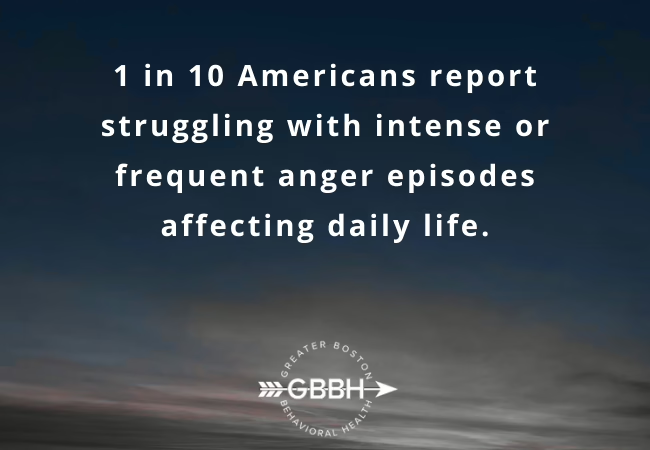Anger is a deeply human emotion. It can serve important purposes—alerting us to injustice, motivating change, or defending boundaries. However, when anger becomes chronic, overwhelming, or explosive, it stops serving you and starts controlling you.
Unchecked anger can hurt relationships, damage careers, trigger physical health issues, and leave you isolated and misunderstood.
The solution isn’t to suppress anger—it’s to understand, manage, and transform it. That’s where Cognitive Behavioral Therapy (CBT) comes in.
At Greater Boston Behavioral Health, we specialize in using Cognitive Behavioral Therapy Boston (CBT) within our Mental Health Programs in Boston, including Intensive Outpatient Programs (IOP), Partial Hospitalization Programs (PHP), Inpatient Treatment Programs, and Residential Treatment Programs to help individuals regain emotional balance and rebuild their lives.
This blog dives into how CBT helps you control anger, the techniques we use, and why this approach works when others fail.
Understanding the Root: How Thoughts, Emotions, and Behaviors Are Connected
At the heart of CBT is a simple but powerful idea:
Your thoughts influence your emotions, which then influence your behaviors.
When anger is a problem, it’s often because:
- Thoughts become distorted (“I’m being attacked,” “They don’t respect me,” “This is unfair!”)
- Emotions surge (rage, resentment, hurt)
- Behaviors escalate (yelling, withdrawing, breaking things, or violence)
CBT interrupts this destructive chain by helping you:
- Identify automatic negative thoughts that trigger anger
- Evaluate and reframe those thoughts rationally
- Learn coping strategies to manage the physical and emotional arousal
- Practice new behavioral responses that support your long-term well-being
Instead of reacting blindly, you gain choice, control, and emotional intelligence.
Step-by-Step: How CBT Helps You Manage Anger
Step 1: Increase Awareness of Triggers
CBT starts by helping you notice the specific situations, people, and internal cues that tend to ignite your anger.
Examples of common triggers:
- Feeling dismissed, disrespected, or ignored
- Experiencing betrayal or injustice
- Facing high-pressure situations without control
- Dealing with reminders of past trauma
Tools used:
- Trigger journals (writing down events that spark anger)
- Anger diaries (tracking intensity, duration, and responses)
- Session-based exploration with a therapist
At Greater Boston Behavioral Health, building this awareness is the first foundational goal of your CBT-based anger management therapy.
Step 2: Identify and Challenge Cognitive Distortions
Often, anger comes not just from what happens—but from how we interpret what happens.
Common distorted thoughts in anger:
- Catastrophizing: “If I don’t fight back, I’ll be humiliated forever.”
- Mind reading: “They’re doing this on purpose to hurt me.”
- Personalization: “Everything bad is aimed at me.”
- All-or-nothing thinking: “Either I win or I’m weak.”
CBT teaches you to:
- Examine the evidence: “What facts truly support this thought?”
- Consider alternative viewpoints: “Could there be another explanation?”
- Test predictions: “What actually happened when I tried responding calmly?”
Outcome:
You learn that many triggers for anger are based on automatic distortions, not reality—freeing you from knee-jerk reactions.
Step 3: Develop Emotional Regulation Skills
Recognizing distorted thoughts isn’t enough—you need practical ways to calm your body and emotions in the moment.
CBT emotional regulation techniques include:
- Diaphragmatic breathing: Slowing down breathing to deactivate the stress response
- Progressive muscle relaxation: Releasing physical tension stored from anger
- Grounding techniques: Anchoring yourself in the present to prevent emotional flooding
- Visualization exercises: Imagining a calm place or peaceful outcome before reacting
In Greater Boston Behavioral Health’s Mental Therapy Programs in Boston, clients practice these techniques daily—in therapy sessions and between sessions—until they become automatic habits.
Step 4: Build Assertive Communication Skills
Poor communication fuels anger. When needs aren’t expressed clearly—or are expressed aggressively—relationships suffer.
In CBT-based anger management therapy, you’ll learn to:
- Express feelings without blame (“I feel upset when plans change last minute”)
- Set healthy boundaries respectfully
- Actively listen to others without assuming hostile intent
- Resolve conflicts collaboratively rather than competitively
Real-life role-play is often used in therapy to build these skills before applying them in high-stakes real-world situations.
Step 5: Create a Personalized Anger Relapse Prevention Plan
Managing anger isn’t just about surviving one conflict—it’s about building resilience for a lifetime.
At Greater Boston Behavioral Health, your CBT journey will culminate in a personal anger management toolkit that includes:
- Identified personal triggers and early warning signs
- Pre-chosen coping strategies for de-escalation
- Communication scripts for difficult conversations
- A support network for accountability
- Steps to take if anger feels unmanageable again (e.g., booster therapy sessions)
You leave with a clear roadmap for long-term emotional control.
CBT Techniques We Use for Anger Management at Greater Boston Behavioral Health
| Technique | Purpose |
|---|---|
| Thought Records | Break down anger episodes to identify triggers, thoughts, emotions, and behaviors |
| Socratic Questioning | Challenge distorted, anger-fueled thoughts logically |
| Behavioral Experiments | Test assumptions by trying new, calmer responses |
| Mindfulness and Relaxation Training | Decrease physiological arousal before anger escalates |
| Problem-Solving Training | Build proactive rather than reactive responses to frustrating situations |
Whether you’re in outpatient therapy, IOP, PHP, or residential care, these tools are adapted to your level of readiness and your goals.
Common CBT Worksheets for Anger Management
At Greater Boston Behavioral Health, clients frequently use worksheets that enhance their self-awareness and coping strategies, including:
-
Thought Record Sheets: Break down anger incidents into triggers, thoughts, emotions, behaviors, and alternative responses.
-
Cognitive Distortion Checklists: Help identify habitual thinking errors (like catastrophizing or black-and-white thinking).
-
Anger Thermometers: Visual scales to track emotional escalation and intervene early.
-
Trigger-Response-Outcome Maps: Understand the chain reaction between trigger, interpretation, behavior, and consequences.
-
Behavioral Experiment Logs: Record the results of using new coping skills in real-world anger-provoking situations.
Therapists review these worksheets weekly in outpatient sessions, IOP groups, and PHP tracks to reinforce learning and accountability.
Misconceptions About Anger That CBT Corrects
Many clients enter therapy with harmful myths about anger. CBT gently challenges these, helping people adopt healthier views:
| Misconception | CBT-Based Truth |
|---|---|
| “Anger is bad and should be avoided.” | Anger is a valid emotion—it’s how we manage and express it that matters. |
| “Expressing anger aggressively is healthy.” | Aggressive outbursts damage trust, relationships, and self-respect. Healthy assertion is key. |
| “Other people are responsible for my anger.” | Others may trigger feelings, but we control our thoughts, emotions, and responses. |
| “If I don’t get angry, I’m weak.” | Staying calm in difficult moments shows strength, not weakness. |
By correcting these misconceptions, CBT fosters emotional maturity, resilience, and inner peace.
When Is a Higher Level of Care Needed?
Sometimes weekly outpatient therapy isn’t enough.
You may benefit from structured anger management programs like:
- Intensive Outpatient Program in Boston (IOP) – Structured support while living at home
- Partial Hospitalization Program in Boston (PHP) – Daily therapeutic work without overnight stay
- Residential Treatment Program in Boston – 24/7 supportive care for complex anger issues tied to trauma or co-occurring conditions
If anger has damaged your relationships, career, or legal standing, or if anger co-exists with depression, PTSD, substance use, or anxiety, a higher level of care may offer the environment you need for real transformation.
Why Choose Greater Boston Behavioral Health for CBT-Based Anger Treatment?
- Licensed experts specializing in CBT, DBT, trauma therapy, and anger management
- Full continuum of care: outpatient, IOP, PHP, residential, inpatient stabilization
- Access to psychiatric care in Boston for clients needing medication support
- Trauma-informed, inclusive, culturally sensitive services
- A non-judgmental environment where healing and growth are prioritized
We believe you’re not broken—you’re capable of change, growth, and peace.
Conclusion
Anger doesn’t have to define you. Through Cognitive Behavioral Therapy, you can learn to recognize your triggers, regulate your emotions, communicate your needs, and build healthier relationships.
At Greater Boston Behavioral Health, we offer a path forward—from reaction to reflection, from conflict to connection, and from anger to empowerment. Call (888) 278-0716 to learn more about how CBT can help you master anger and transform your life.
FAQ on CBT for Anger Management
What is Cognitive Behavioral Therapy (CBT) for anger management?
CBT is a proven therapy that helps individuals recognize anger triggers, challenge distorted thoughts, regulate emotions, and adopt healthier behavioral responses.
Can CBT completely eliminate anger?
No. CBT doesn’t aim to eliminate anger but teaches how to experience anger in a controlled, constructive way rather than reacting impulsively or aggressively.
How long does CBT take to help manage anger?
Many individuals notice improvements within 8–12 sessions. However, lasting change often requires ongoing practice and, for more complex cases, extended therapy in IOP, PHP, or residential care.
Is CBT part of Greater Boston Behavioral Health’s programs?
Yes. CBT is integrated across outpatient therapy, Intensive Outpatient Programs (IOP), Partial Hospitalization Programs (PHP), and Residential Treatment Programs to help clients manage anger and emotional regulation.
Can CBT help if my anger is linked to trauma or PTSD?
Absolutely. CBT techniques are highly effective for managing anger rooted in trauma, especially when combined with trauma-informed care models offered at Greater Boston Behavioral Health.


